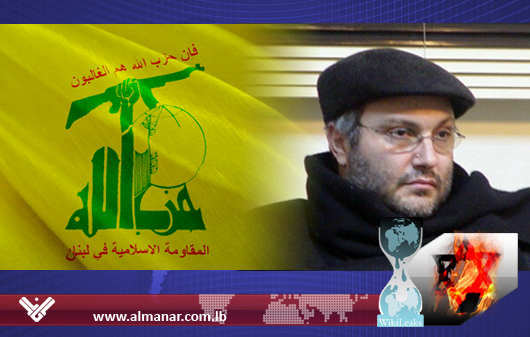Wikileaks secret cables show Israel scared of potential Hezbollah reaction to assassination of its top military commander Imad Moghniyyeh
Day after another, the WikiLeaks scandalous cables continue to make the headlines in Lebanon and the region…
The mentioned cables have actually shown how Israel was scared of Hezbollah retaliation to the assassination of its top military commander Imad Moghniyyeh (Hajj Redwan), revealing that the Israeli have expressed to United Nations officials big worries of Hezbollah potential reaction to Hajj Redwan’s martyrdom. The worries pushed the Israeli officials to accuse Hezbollah of standing behind the attack on an Israeli diplomatic convoy in Jordan.
According to leaked US cables also published by Israeli daily Haaretz, Israeli Chief of Staff Gabi Ashkenazi told the United Nations' envoy to Lebanon Michael Williams in January that Israel holds information pointing to Hezbollah involvement in the attack on an Israeli diplomatic convoy in Jordan. The Israelis believed the mentioned attack was apparently part of a Hezbollah response to the assassination of Hajj Redwan who was martyred in Damascus in 2008.
The newly released WikiLeaks cables indicated that Israel has warned US and international officials of a serious response to any Hezbollah attack against Israeli targets abroad.
The site also published a cable sent from the US embassy in Beirut in which Ashkenazi and Israeli Prime Minister Benjamin Netanyahu's advisers expressed concern that Hezbollah would want to respond to the Feburary 2008 assassination of Moghniyyeh.
According to the cables, the UN's envoy to Lebanon Michael Williams met on January 29, 2010, with the US envoy in Beirut Michele Sison and informed her of his conversations with officials in the occupied territories. He reportedly warned the US envoy that if there were to be another rocket attack on the occupied territories from Lebanon, Israel will respond with magnified strength. "UNIFIL will not be able to halt an escalation and everything that we have worked on would disappear within 12 hours," Williams warned according to the cable.
Another cable revealed that in June of 2009, Nimrod Barkan, Israel’s head of the Foreign Ministry's Center for Political Research, and Amos Gilad, head of the Israeli Defense Ministry's political security department have cautioned against a Hezbollah attack as a response to Moghniyyeh’s assassination.
Barkan claimed that Israel has already foiled two terror attacks by Hezbollah in foreign countries. "We have sensitive information that Hezbollah has completed its operational preparations for a third attack against Israeli targets abroad," Barkan went on to say.
Meanwhile, Israeli media sources confirmed WikiLeaks reports that Hezbollah has been provided with long-range Scud D missiles. According to the sources, Hezbollah had the capacity to strike most of the occupied territories, including Tel Aviv.
FELTMAN CONCERNED, AFRAID...
In the meantime, US Assistant Secretary of State for Near Eastern Affairs Jeffrey Feltman expressed concern over cables released by WikiLeaks, saying the information might be used to sow strife in Lebanon.
In a phone conference with Arab reporters in Washington, London and some Arab capitals, Feltman said he was afraid that some Lebanese nationalists would be harmed for cooperating with the US for better ties between Washington and Beirut.
Rejecting accusations that the WikiLeaks cables showed the international tribunal was politicized, the former US ambassador to Lebanon claimed the problem was not in the court itself but in threats by some parties to resort to violence to obstruct the course of justice.
Feltman described the leaks as an "attack on the international community," saying they obstruct diplomatic work aimed at solving crises in different parts of the world.
The diplomat stressed that cables sent by US embassies include primary and most of the time incomplete information that are added to other info before being submitted to decision-makers in Washington.
